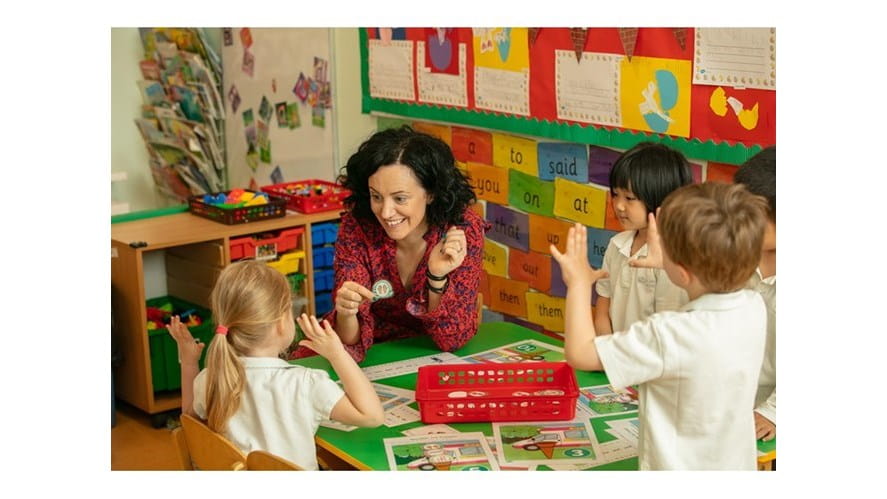We use cookies to improve your online experiences. To learn more and choose your cookies options, please refer to our cookie policy.

Reading is one of the most powerful tools for developing a child’s educational skills. Linked to improved concentration, memory, and imagination, children are never too young to be introduced to the power of books and other forms of reading.
During a child’s time in Reception and Year 1, reading will be a significant developmental focus. As a parent, you can get involved too. Here’s how to understand your child’s reading level, plus some games and books you can use to help improve their proficiency.
In Reception and Year 1 classes where ages can vary from 4-6 years old, establishing a picture of each child’s reading level can influence how a teacher structures a session. To do that, they will assess each child using a Guided Reading Level (GRL).
Guided reading is commonly used by teachers to improve the reading proficiency of small groups of roughly four to six children. Members of these groups will all have a similar level of reading proficiency, allowing them to all read from texts that are of similar difficulty.
To understand a child’s guided reading level, they will sit down with a teacher for a one-to-one reading session. Using a book that is considered standard for children of that age, the teacher will assess the child’s proficiency when reading aloud. They will look to assess a child’s:
Along the way, the child may be asked questions about the story, assessing the level at which they are understanding what they are reading. Teachers may choose to document common errors or reading miscues to help inform their future instruction. Children are then given a Book Band Level which can be used as a benchmark for future learning.
Once each child has their reading level, teachers can assign an appropriate book that matches their skill level. The reading level of a book is judged on things such as:
As everyone in a guided reading group is on the same level, teachers can tailor their approach to maximise progression. This way, teachers can focus on the individual needs of a child and offer better support.
If you’re looking for some inspiration on the books you could buy to help your child improve their reading, the first person to ask is their teacher. They should be able to recommend some books that are appropriate for your child and will be able to specify books for reading aloud.
There are also innumerable online resources to help you. For example, Goodreads has extensive lists of books tailored for different ages and circumstances and includes user votes to ensure only the best books are included.
Their lists include:
At this stage, a child will only have a rudimentary understanding of texts they are reading. As a parent, you can aid their progress by playing a few easy, fun reading games at home. Here are three to get you started:
1. Phonics Flipbook
For this, all you need is a notepad, some scissors, tape, and a marker pen. Cut the notepad into three (or four for more advanced readers) equal sections. On every page of the notepad, write a letter on each of the three sections, leaving you a flipbook of letters that make up different sounds and simple words.
As you flip a section, a new sound and word are created. These are ideal for learning basic sounds like “c-a-t” or “b-a-g”. Even if nonsense words like “p-a-f” come up, it’s worth saying them out loud as the sound could occur in more complex words. A phonics flipbook is a great way to grasp basic sounds and how they combine to make words.
2. Concentration
Once you’ve finished a reading session, take five words from the book you’ve just been reading and write them on small pieces of cut-up card, two times over (giving you 10 cue cards).
Shuffle the pack and place them in rows. Then, take it in turns to flip two cards over and read the words aloud. If they match, that player keeps the pair. Keep going until all the cards are matched.
This is a way to reinforce and recognise whole words and sounds, without putting too much pressure on saying it fluently or understanding its meaning. To up the difficulty, choose less distinctive words like “what” and “how”.
3. Word family ball toss
If a child can recognise a sound that makes up a certain word, they can apply that sound to other words in the “family” that use the same sound.
To play you need some ping pong balls, a few small containers, and a pen. Pick a few word families, here are some easy examples:
Write words from your chosen families on each of the ping pong balls, then write a sound on each container. To play, the child picks up a ping pong ball, reads out the word, then throws it into the corresponding pot.
Learning to read is one of the most significant early milestones in a child’s education. As a parent, improving your child’s reading skills is one of the most helpful contributions you can make to their learning pathway. To see how Nord Anglia International School Manila prioritises reading at an early age, get in touch with us at NAIS Manila.
If you want to know more about our school's Early Years Programme , we are currently offering Virtual Discovery Meetings.
Make an appointment today to speak with our Admissions Team online, discuss with them your child’s learning needs and how we can meet them, and enjoy a multi-media introduction to our teachers, students, and facilities.
Click the link below to book your Virtual Discovery Meeting today!